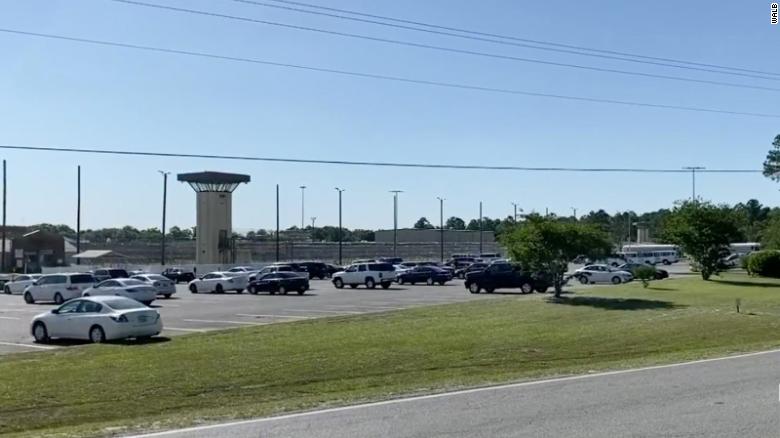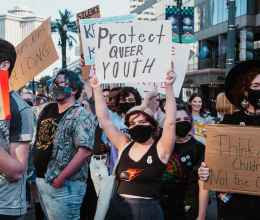
Family gets $2.2 million settlement for death of Georgia inmate, calls for criminal investigation
Family gets $2.2 million settlement for death of Georgia inmate, calls for criminal investigation
By Christina Carrega | CNN | December 6, 2021
Other Pages
Jenna Mitchell, in an older photo, threatened suicide while an inmate at Valdosta State Prison. She died at a Georgia hospital on December 6, 2017.
(CNN)Georgia's troubled prison system has agreed to pay $2.2 million to the family of a transgender woman, whose threats of suicide were ignored and who was left hanging in her cell for several minutes before getting medical help, according to surveillance video and sworn statements filed as part of a civil lawsuit.
The settlement is one of the biggest wrongful death settlements in the history of Georgia's prison system and comes as the Justice Department has launched a sweeping civil rights investigation into allegations of unconstitutional abuses of prisoners in Georgia prisons.
Jenna Mitchell would have celebrated her 29th birthday last month. Instead, four years after she died in the hospital after hanging herself with bedsheets while in solitary confinement, Mitchell's family is still mourning her death.
"The financial settlement is barely nudging any kind of justice," Sheba Maree, Mitchell's mother, told CNN in an exclusive interview. "I'd rather have my child ... nothing will ever, ever, ever, ever take the place of my child. To me, this is blood money, and I will not stop until the people involved with her death are held responsible."
Maree is calling for a criminal investigation into the death. She believes her daughter was neglected by the guards because she was transgender.

Valdosta State Prison in south Georgia.
State prisons throughout Georgia have come under fire for years from a litany of residents, family members and civil rights organizations who have complained about what they describe as inhumane conditions such as feces- and urine-covered cells due to sewage backups and prisoner-on-prisoner violence.
In September, the Justice Department's Civil Rights Division announced a statewide investigation into homicides inside prisons, prisoner-on-prisoner violence and the sexual abuse of gay, lesbian and transgender prisoners by other inmates and staffers.
Kristen Clarke, leader of the Justice Department's Civil Rights Division, said at the time of the announcement that the statewide investigation will also address the devastating effects of "prison staff shortages, inadequate policies and training and the lack of accountability."
Maree and all named defendants in the lawsuit agreed to dismiss the civil lawsuit with prejudice, according to the settlement document filed in court on Monday.
CNN reached out to the Georgia Department of Corrections for comment, and a spokeswoman referred questions to state Attorney General Chris Carr's office. Carr's office has declined to comment.
Mitchell was an inmate at Valdosta State Prison serving up to 10 years for a 2015 robbery conviction. While she identified as a transgender woman, she was being held at prison for men.
Maree says she watched in horror for two days as her oldest child, who dreamed of joining the military and admired servicemembers, was in a coma after hanging herself while in solitary confinement and handcuffed to a hospital bed.
A Justice Department spokeswoman said that Valdosta is within the scope of its civil rights investigation.
Days prior to Mitchell's suicide, Maree said she called the prison and informed the warden that her daughter was threatening suicide.
Mitchell suffered from schizophrenia, bipolar disorder and untreated gender dysphoria, according to the family's lawsuit. Instead of placing her on suicide watch, she was transferred to a building dedicated to solitary confinement of inmates, according to a deposition with a prison official.
Maree said her daughter had been in solitary confinement off-and-on for eight to nine months and that she "hardly ever got to talk to her."
"They killed my child; they did nothing to help my child," Maree said as her voice cracked.
More than 30 minutes of surveillance video from inside of the prison that was filed as part of the lawsuit and reviewed by CNN shows a corrections officer and sergeant making the rounds in a section of the prison where Mitchell was being held.
According to the lawsuit, the officer and sergeant ignored Mitchell's pleas for help and then failed to respond in a timely way when she attempted to hang herself in her cell.
 Jenna Mitchell, in an older photo
Jenna Mitchell, in an older photo
The video, which doesn't have audio, also shows an unidentified inmate who worked as an orderly in the prison in the area near Mitchell's cell. The orderly, whose name was redacted from court documents, said he tried to get the sergeant and corrections officer to help Mitchell, according to a declaration turned over by the family's attorneys as part of the discovery process and shared with CNN.
The orderly said the corrections officer taunted Mitchell and encouraged her to take her own life, saying "OK, what are you waiting for, go for it." After a few minutes, the officer walked away and Mitchell yelled, "Don't leave me," according to the orderly's declaration.
Shortly after the corrections officer walked away, the orderly walked over to Mitchell's cell, saw her hanging from a noose connected to a vent, with her feet not touching the ground, according to the declaration.
The orderly said he ran to find the sergeant, who he said smirked and laughed when told that Mitchell had hung herself. The video shows the sergeant and then the corrections officer walking away, and more than 10 minutes passes before they return.
The sergeant and corrections officer denied parts of the orderly's story, including the taunting and failure to act quickly, according to depositions they gave in the lawsuit. They said they didn't have the proper tool to "cut down" Mitchell from the noose, and a third corrections officer ran to get medical personnel to help.
David Shanies, a civil rights attorney who represented the family, said that there was a "superficial" investigation conducted by the Georgia Department of Corrections that resulted in recommendations that staffers be retrained on how to handle an inmate suicide.
"There wasn't a real investigation into what happened; there needs to be an investigation held to find out what happened to Jenna," Maree said. "They need to investigate what happened to my child and those involved need to go to prison."
Shanies said: "The lack of any meaningful investigation was shocking and inexcusable. Prison guards stood by and let a person die in front of their eyes. ... It is deeply unsettling."
The warden at the time of Mitchell's death, who also was named in the lawsuit filed by Shanies and the ACLU, declined to comment. The corrections officer, also named as a defendant, could not be reached to comment.
Shanies says this settlement is a record-setting civil recovery in connection to a Georgia prisoner's death. Public records show that the last six-figure payout was in 2016 for $1.2 million following the December 1999 death of Thomas M. Fitzgerald, who died while being strapped to a bed in an isolated cell.
Related content


Legislative Recap: Five Bills To Watch Through the End of Session
March 8, 2024
Legislative recap: Committee Passes Anti-LGBTQ+ Bill Without Taking...
February 16, 2024
Stonewall activist Miss Major, ACLU of Georgia and Georgia Equality...
October 27, 2023Press Statement: Federal Judge Staying Preliminary Injunction...
September 6, 2023Federal Judge Issues Injunction that Restores Health Care for...
August 21, 2023
“You Show Up”: An Interview with ACLU of Ga.’s Outstanding...
April 10, 2023